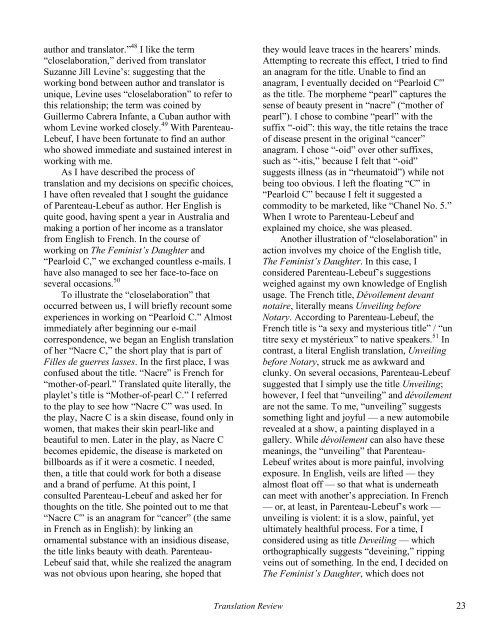Translation Review - The University of Texas at Dallas
Translation Review - The University of Texas at Dallas
Translation Review - The University of Texas at Dallas
You also want an ePaper? Increase the reach of your titles
YUMPU automatically turns print PDFs into web optimized ePapers that Google loves.
author and transl<strong>at</strong>or.” 48 I like the term<br />
“closelabor<strong>at</strong>ion,” derived from transl<strong>at</strong>or<br />
Suzanne Jill Levine’s: suggesting th<strong>at</strong> the<br />
working bond between author and transl<strong>at</strong>or is<br />
unique, Levine uses “closelabor<strong>at</strong>ion” to refer to<br />
this rel<strong>at</strong>ionship; the term was coined by<br />
Guillermo Cabrera Infante, a Cuban author with<br />
whom Levine worked closely. 49 With Parenteau-<br />
Lebeuf, I have been fortun<strong>at</strong>e to find an author<br />
who showed immedi<strong>at</strong>e and sustained interest in<br />
working with me.<br />
As I have described the process <strong>of</strong><br />
transl<strong>at</strong>ion and my decisions on specific choices,<br />
I have <strong>of</strong>ten revealed th<strong>at</strong> I sought the guidance<br />
<strong>of</strong> Parenteau-Lebeuf as author. Her English is<br />
quite good, having spent a year in Australia and<br />
making a portion <strong>of</strong> her income as a transl<strong>at</strong>or<br />
from English to French. In the course <strong>of</strong><br />
working on <strong>The</strong> Feminist’s Daughter and<br />
“Pearloid C,” we exchanged countless e-mails. I<br />
have also managed to see her face-to-face on<br />
several occasions. 50<br />
To illustr<strong>at</strong>e the “closelabor<strong>at</strong>ion” th<strong>at</strong><br />
occurred between us, I will briefly recount some<br />
experiences in working on “Pearloid C.” Almost<br />
immedi<strong>at</strong>ely after beginning our e-mail<br />
correspondence, we began an English transl<strong>at</strong>ion<br />
<strong>of</strong> her “Nacre C,” the short play th<strong>at</strong> is part <strong>of</strong><br />
Filles de guerres lasses. In the first place, I was<br />
confused about the title. “Nacre” is French for<br />
“mother-<strong>of</strong>-pearl.” Transl<strong>at</strong>ed quite literally, the<br />
playlet’s title is “Mother-<strong>of</strong>-pearl C.” I referred<br />
to the play to see how “Nacre C” was used. In<br />
the play, Nacre C is a skin disease, found only in<br />
women, th<strong>at</strong> makes their skin pearl-like and<br />
beautiful to men. L<strong>at</strong>er in the play, as Nacre C<br />
becomes epidemic, the disease is marketed on<br />
billboards as if it were a cosmetic. I needed,<br />
then, a title th<strong>at</strong> could work for both a disease<br />
and a brand <strong>of</strong> perfume. At this point, I<br />
consulted Parenteau-Lebeuf and asked her for<br />
thoughts on the title. She pointed out to me th<strong>at</strong><br />
“Nacre C” is an anagram for “cancer” (the same<br />
in French as in English): by linking an<br />
ornamental substance with an insidious disease,<br />
the title links beauty with de<strong>at</strong>h. Parenteau-<br />
Lebeuf said th<strong>at</strong>, while she realized the anagram<br />
was not obvious upon hearing, she hoped th<strong>at</strong><br />
they would leave traces in the hearers’ minds.<br />
Attempting to recre<strong>at</strong>e this effect, I tried to find<br />
an anagram for the title. Unable to find an<br />
anagram, I eventually decided on “Pearloid C”<br />
as the title. <strong>The</strong> morpheme “pearl” captures the<br />
sense <strong>of</strong> beauty present in “nacre” (“mother <strong>of</strong><br />
pearl”). I chose to combine “pearl” with the<br />
suffix “-oid”: this way, the title retains the trace<br />
<strong>of</strong> disease present in the original “cancer”<br />
anagram. I chose “-oid” over other suffixes,<br />
such as “-itis,” because I felt th<strong>at</strong> “-oid”<br />
suggests illness (as in “rheum<strong>at</strong>oid”) while not<br />
being too obvious. I left the flo<strong>at</strong>ing “C” in<br />
“Pearloid C” because I felt it suggested a<br />
commodity to be marketed, like “Chanel No. 5.”<br />
When I wrote to Parenteau-Lebeuf and<br />
explained my choice, she was pleased.<br />
Another illustr<strong>at</strong>ion <strong>of</strong> “closelabor<strong>at</strong>ion” in<br />
action involves my choice <strong>of</strong> the English title,<br />
<strong>The</strong> Feminist’s Daughter. In this case, I<br />
considered Parenteau-Lebeuf’s suggestions<br />
weighed against my own knowledge <strong>of</strong> English<br />
usage. <strong>The</strong> French title, Dévoilement devant<br />
notaire, literally means Unveiling before<br />
Notary. According to Parenteau-Lebeuf, the<br />
French title is “a sexy and mysterious title” / “un<br />
titre sexy et mystérieux” to n<strong>at</strong>ive speakers. 51 In<br />
contrast, a literal English transl<strong>at</strong>ion, Unveiling<br />
before Notary, struck me as awkward and<br />
clunky. On several occasions, Parenteau-Lebeuf<br />
suggested th<strong>at</strong> I simply use the title Unveiling;<br />
however, I feel th<strong>at</strong> “unveiling” and dévoilement<br />
are not the same. To me, “unveiling” suggests<br />
something light and joyful — a new automobile<br />
revealed <strong>at</strong> a show, a painting displayed in a<br />
gallery. While dévoilement can also have these<br />
meanings, the “unveiling” th<strong>at</strong> Parenteau-<br />
Lebeuf writes about is more painful, involving<br />
exposure. In English, veils are lifted — they<br />
almost flo<strong>at</strong> <strong>of</strong>f — so th<strong>at</strong> wh<strong>at</strong> is underne<strong>at</strong>h<br />
can meet with another’s appreci<strong>at</strong>ion. In French<br />
— or, <strong>at</strong> least, in Parenteau-Lebeuf’s work —<br />
unveiling is violent: it is a slow, painful, yet<br />
ultim<strong>at</strong>ely healthful process. For a time, I<br />
considered using as title Deveiling — which<br />
orthographically suggests “deveining,” ripping<br />
veins out <strong>of</strong> something. In the end, I decided on<br />
<strong>The</strong> Feminist’s Daughter, which does not<br />
<strong>Transl<strong>at</strong>ion</strong> <strong>Review</strong> 23

















